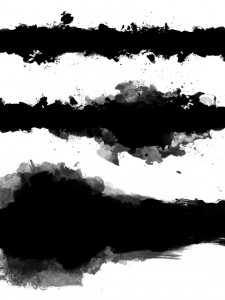The History of Histories (Part 6)
By Asher Crispe: November 6, 2012: Category Inspirations, Quest of the Question
Dual Deeds and Free Agents
 Often in medical imaging a contrast dye has to be injected into the patient. Its purpose is simple: to help differentiate one thing from another by highlighting the differences. So too, the programing of free agents into Creation who are capable of making choices, even if they go against the explicit imperatives of the Commander and Chief, only serves to bring out the advantages of making the right choices over the wrong ones. We sense this every time something undesirable happens and we experience the shock to the heart, a sinking stomach and a sweaty brow. How could things turn out this way? This is not how it’s supposed to be! In other words, we often know about the merit of the right way of doing things from comparison with negative outcomes. Recognition demands setting choices in relief. If I cannot tell one thing apart from its opposite then I lose my motivation and appreciation for choosing one over the other.
Often in medical imaging a contrast dye has to be injected into the patient. Its purpose is simple: to help differentiate one thing from another by highlighting the differences. So too, the programing of free agents into Creation who are capable of making choices, even if they go against the explicit imperatives of the Commander and Chief, only serves to bring out the advantages of making the right choices over the wrong ones. We sense this every time something undesirable happens and we experience the shock to the heart, a sinking stomach and a sweaty brow. How could things turn out this way? This is not how it’s supposed to be! In other words, we often know about the merit of the right way of doing things from comparison with negative outcomes. Recognition demands setting choices in relief. If I cannot tell one thing apart from its opposite then I lose my motivation and appreciation for choosing one over the other.
Given that the language of the Torah is not addressed to rocks and minerals nor angelic beings, but rather to the sphere of humanity–to the phenomenology of our life-world–it should be expected that much of the description and prescription of the Torah employs a contrast theory of meaning. Dr. Seuss aside, we do inhabit a wacky world of opposites whose signification depends on ramping up the polarity between them. Giants become all the more imposing when placed next to midgets etc…. As the theory goes, one cannot truly know the elation of a breakthrough unless one had to first struggle to get there. This was Adam’s dilemma. Born in the lap of Edenic luxury with his every need attended to, one senses he had no lack except for a sense of lack. Moreover, he could have taken the easy way out of the roller coaster of history by refraining from eating from the Tree of Knowledge. Along the lines of the arm chair philosophy that says ‘you can’t really know something until you’ve tried it’ Adam, faced with a lack of lack, opts for hard earned success after struggle rather than eschewing all challenge.
Much of the time we repeat this same selection. Why else would we go on reality TV shows like Survivor, or Fear Factor, or American Gladiator voluntarily? You mean we have the option to choose not to punish our bodies by running a marathon? And yet we sign up by the thousands for the opportunity to do so. Why? Because we love challenge.
Some more than others fit the bill for being adrenaline junkies with borderline psychotic thrill-seeking obsessions. Yet, generally speaking we all engage in dangerous activities out of the need for excitement and not out of coercion. Adventure comes at the price of risk. Our personhood acquires stripes when we do battle, test ourselves and push it to the limit. Adam is everyone. He is called ‘primordial man’ in Kabbalah because the snap shot we have of his life gives us insight into the primal human condition. As the first human being in a genealogical sense, Adam exemplifies the firstness of our humanity, the kernel of our psyche. Therefore, his actions form a psychic residue within each and every one of us. We also accept falling down and failure as a possibility because ultimately we want our success to mean something. When we turn our ship around, come from behind, or overpower our own self-destructive tendencies to do the right thing, the score has so much more meaning to it. If I am my will, then only an expression of my will-power, of my choices, of my navigation, impacts me as true accomplishment.
Tracking the parallel in the interpersonal field, speaking as a CEO I would find it near impossible to know if any of my employees really like me and agree with my decisions or find wisdom in my remarks if they are paralyzed with fear of being fired for speaking up or out. ‘Do you really love me or are you just paying me lip serve because you have to?’ Hence, the pop culture label of ‘yes-man’ amounts to someone who is no more than a trained parrot.
In Chassidic thought this is called bitual chitzoni or external self-nullification. To put it bluntly: it does not pay for me to have an opinion so I will keep up appearances superficially, bowing to your every wish. However, if left to my own devices I would say otherwise, do otherwise. I would go my own way. This divergence between how I would do things and how my CEO would wish them done casts me in a role in which I do not fully recognize myself. If the CEO is code for God in our analogy, then I may find guilt or concerns for my spiritual bank account (the whole reward and punishment system) to be the motivation behind everything I do. But it means that only the empty shell of a person is doing them.
Performances such as these are not convincing for those who can look into the windows of the soul. And while hollow gestures where ‘I’ am not all there still have some value in that they can make the world a better place (imagine saying to a person ‘I don’t care if you’re into the whole “do not kill” me commandment thing’ or that by not murdering me you feel like you’re betraying your most basic instincts and can no longer be the real you; bottom line: I don’t want you to kill me or anyone else) nonetheless, it would be preferable if you had your heart into it. The end goal is to do things with one’s entire being, inside and out, to act not out of compulsion but because that is also your will, that His will and your will are united so that Him telling you to do something and you telling yourself to do it amount to almost the same thing. Everything blurs. ‘So you mean, that even without the carrot and the stick, I would automatically choose what’s right?’ I see for myself the advantage of light over darkness precisely because of the high contrast between the two. No further provocation needed.
Consequently, only when the CEO provides the open forum for discussion (‘permission to speak freely’) can the inner dedication of the team be ascertained. God too wants us to serve Him with our own free will, but to achieve that result there may have to be the possibility of opposing the Divine will. Even a temporary rebellion can be worth it if in the end there is a last commitment to what’s right, that we come around (teshuvah: literally to ‘return’) eventually. God plays the long game. The one in which short-term losses are suffered and delays in producing the final product are tolerated, in order to have everyone really on board, believing in the goal, loving it, being in awe of it and living it through and through.
A digression on the nature of omnipotence: being all powerful means that power can be exercised or not exercised. Unlimited power without limited power (or more accurately the capacity to self-limit the expressions of that power) would prove to be limited to the unlimited. This bifurcation would suggest that there are two power classes–the unlimited one which is Divine and then the limited power which belongs to something other. Since the Torah explains that there is no real other (that ‘everything is God and God is everything’) the power of self-limitation would also be in the hands of the Divine. ‘All powerful’ therefore admits no rival. All manners of power, infinite and finite, are contained therein.
Combing through this argument divulges the essential paradox of omnipotence. Holding fast to this coincidence of opposites supports the case for a Creation that can elect to either listen to the voice of its Creator or oppose His will. The Hebrew expression for omnipotence is kol yakol [כל יכול] literally means ‘everything/all’ plus ‘to be able.’ Looking closely at these two words, one notices that they have the shared letters Kaf and Lamed [כל]. These two letters are instrumental in forming (with the addition of the letter Yud) another ultra-important word in Jewish mysticism which is keli [כלי], a vessel, tool or vehicle. The significance of this word comes from the Divine intention that every part of Creation becomes an instrument for revealing Divinity. Hence, ‘all powerful’ may be interpreted as ‘everything is [potentially] a vessel or finite container within which the infinite light of the Creator can be revealed.’
 If we properly absorb this last bit of information, then the function of darkness as the contrast dye for light becomes evident. As odd as it is, the absence of something (darkness as the absence of light) can frame the need for the very thing which is missing. Thus, indirectly it serves its opposite. In the words of the Ba’al Shem Tov “evil is a seat for the good.” Want to show off how good good is? Just juxtapose it next to something not so good. Yet, the list of surrogates for negativity–darkness, sin, lack, entropy, death–can also provide more than indirect support. Full fledged conversion of the negative (where one says: ‘I’ve been there, done that, know what it’s like and from the experience that I gained, now know to choose the right thing out of positive attraction and of my own free will) transforms the darkness itself into a source of light.
If we properly absorb this last bit of information, then the function of darkness as the contrast dye for light becomes evident. As odd as it is, the absence of something (darkness as the absence of light) can frame the need for the very thing which is missing. Thus, indirectly it serves its opposite. In the words of the Ba’al Shem Tov “evil is a seat for the good.” Want to show off how good good is? Just juxtapose it next to something not so good. Yet, the list of surrogates for negativity–darkness, sin, lack, entropy, death–can also provide more than indirect support. Full fledged conversion of the negative (where one says: ‘I’ve been there, done that, know what it’s like and from the experience that I gained, now know to choose the right thing out of positive attraction and of my own free will) transforms the darkness itself into a source of light.
For Part Seven, we will introduce four paradigmatic transgressions and see how they relate to different aspects of reality and to the production of universal history or parallel histories.
http://www.interinclusion.org/inspirations/the-history-of-histories-part-7/
http://www.interinclusion.org/inspirations/the-history-of-histories-part-5/























;)
;)
;)
;)
;)
;)
;)
;)
;)
;)
